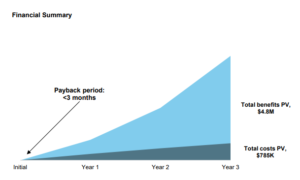
DataRobot Report Claims Massive ROI for Its Enterprise AI Tools

Enterprise AI firm DataRobot has, in partnership with Forrester Consulting, released the results of a new study of the return on investment for DataRobot’s tools – and, perhaps unsurprisingly, DataRobot’s report has found that DataRobot’s products deliver an enormous return on investment (ROI). The “total economic impact study” assessed DataRobot’s financial impacts over the course of three years on a variety of organizations, finding an ROI of 514%.
Forrester’s total economic impact (or TEI) study aimed to “identify the cost, benefit, flexibility, and risk factors that affect the investment decision.” The process began with interviews with DataRobot stakeholders and interviews with four customer organizations, after which Forrester built a “composite organization” based on the characteristics of the interviewed customers. Then, Forrester constructed a model financial framework that attempted to capture the risks and concerns of the interviewed customers, measuring the costs and benefits of the DataRobot tools within this mock case study.
The customers used for the study – two in retail, one in manufacturing, and one in healthcare – all earned billions in yearly revenue and employed thousands of employees, and all paid a fixed price (approximately $300,000) for DataRobot’s licensing and services, although DataRobot’s prices can range from $50,000 to millions annually depending on the size and needs of a given business.
Based on the simulated business derived from interviews with those organizations, Forrester landed on its estimates. The report claims $1.35 million in benefits over three years from “improved online opportunity conversion” (i.e. marketing and customer targeting); $1.29 million from increased data science efficiency, with the tools allowing data teams to offload large portions of their workloads; $1.25 million from improved demand forecasting; $570,000 from more efficiency holiday staffing; $200,000 in decreased costs of fraud; and $151,000 from an improved churn rate. On the other hand, Forrester’s report claims relatively low costs over those three years: $746,000 for licensing, $7,900 for implementation and deployment, and $31,500 for management.

Costs and benefits of the implementation in the composite organization over time. Image courtesy of DataRobot.
In short, Forrester says that the hypothetical organization made bank from its simulated DataRobot deployment, delivering a net present value of over $4 million and a 514% ROI. DataRobot claims that this quite substantial estimate is actually conservative. “The model serves as a conservative description of the value that the interviewed companies realized and which are likely to be generally realized by most firms using DataRobot,” the report reads. “It does not attempt to model the extreme benefits and use cases that Forrester discovered during the interview process.“
To that end, DataRobot is touting the results as a testament to the financial power of enterprise AI – and, specifically, its implementation of enterprise AI.
“There’s no question that being successful with AI is hard. DataRobot is committed to helping customers overcome these challenges, using its market leading end-to-end AI and expertise to drive maximum business value from this technology in record time,” said Dan Wright, president and COO of DataRobot. “We are proud of the work we have done to help our customers transform their businesses with our platform, and have our eyes set on enabling even more companies around the world to unlock the full power of human and machine intelligence.”
Related Items
Gartner Gets Hyped for Emerging Tech
Meaningful Customer Experiences and Increased Revenue Start with Connected Data
DataRobot Adds to its AI Toolbox






























